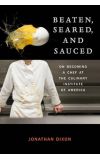
10 May 2011 04:23:45
The problem is there's not that much to tell. Dixon was a nearly 40-year-old writer muddling through life with a series of uninspiring jobs and lack of direction when he decided to pursue his passion for cooking. He enrolled at the CIA in Hyde Park, N.Y., on a scholarship.
He reports that yelling and browbeating were most chefs' preferred methods for imparting their knowledge, but that's unlikely to come as a surprise to anyone who has read many of the chef memoirs on the market. According to them, short tempers and tyrannical tendencies run amok in most of the nation's top restaurant kitchens.
Perhaps the most shocking thing Dixon discovered is his teachers' tendencies to overlook errors in his dishes. After tasting dozens of plates during final exams, they didn't always notice mistakes in seasoning or construction of a sauce. If a meat or vegetable's texture seemed right, it passed. There are probably worse things that could be said for an educational institution.
That doesn't mean there weren't dark moments in Dixon's education. His externship at a well-regarded Manhattan restaurant is a nightmare with bullying bosses, hostile co-workers and long hours for little pay. When Dixon thinks his work is improving, the top chef tells him it's not. On his last day, a manager prevents the other chefs from giving him the traditional send-off of a dunk in the ice bath.
"I was actually surprised as I stood at my station how hurt I felt," Dixon recalls.
By graduation, he has made a startling discovery, but it's about himself, not the school. He's at a cooking competition when he realizes the chefs who excel begin striving long before they have any hope of success.
"Every gesture, no matter how small, was about the individual attempting to be great," he says. Greatness is attainable, he continues, "but not by me ... with all my hesitations, my timidity, my half-assed methodology of doing what was expected of me but little more."
His lack of success — as a writer and a cook — he realizes, was not due to a lack of talent but a lack of confidence.
Dixon ends his memoir unemployed on graduation day. It could use a postscript: Did he ever develop confidence and get his life on track?

